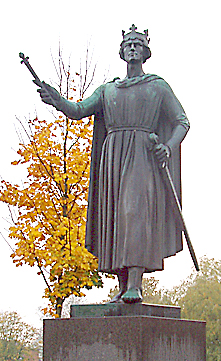 | |
| Gender | masculine |
|---|---|
| Origin | |
| Word/name | Germanic |
| Meaning | "power"+"fame"; "powerful and famous", "brightness"+"fame"; "bright and famous" |
| Other names | |
| Alternative spelling | Valdemar, Waldomar, Waldek |
| Variant forms | Valdamarr, Valdemārs, Valdimar, Voldemārs, Valdis, Voldemar, Woldemar |
| Related names | Vladimir, Volodymyr |
| See also | Robert (name with a similar meaning) |
Waldemar, Valdemar, Valdimar , or Woldemar is an Old High German given name. It consists of the elements wald- "power", "brightness" and -mar "fame".
Contents
The name is considered the equivalent of the Latvian name Valdemārs, the Estonian name Voldemar, and the Slavic names Vladimir, Volodymyr, Uladzimir or Włodzimierz.[ citation needed ]
The Old Norse form Valdamarr (also Valdarr) occurs in the Guðrúnarkviða II as the name of a king of the Danes. The Old Norse form is also used in Heimskringla, in the story of Harald Hardrada, as the name of a ruler of Holmgard (Veliky Novgorod). [1] [2] The Fagrskinna kings' sagas also have Valdamarr, in reference to both Vladimir the Great and Vladimir Yaroslavovich.[ citation needed ]
People with the name include: